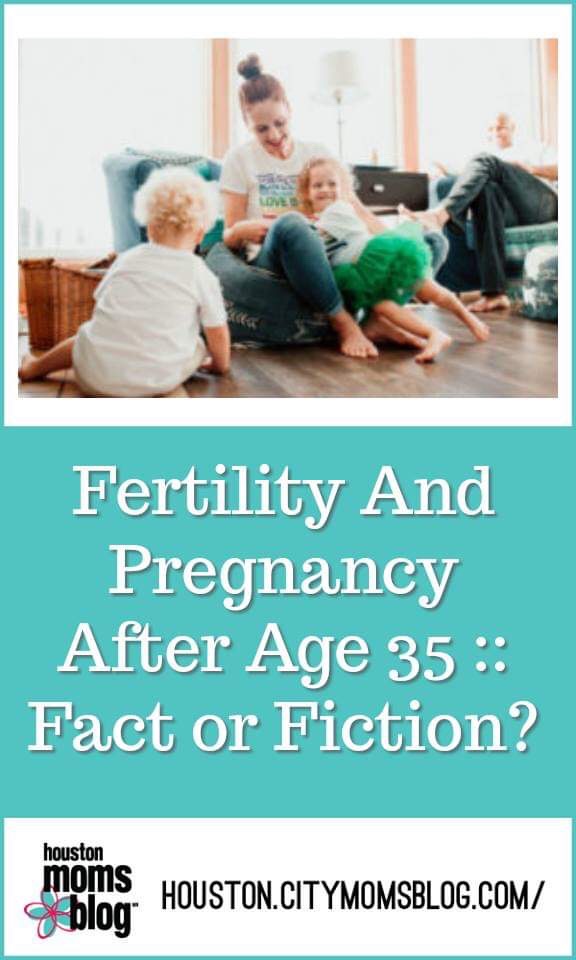
Fertility After 35 :: Fact or Fiction?
A woman is born with all the eggs she will ever have in her lifetime :: FACT
A female is born with 1-2 million eggs. At puberty she has 300,000-500,000,at age 37 she has 25,000, and age 51 she has 1,000 eggs left. Most women are no longer able to become naturally pregnant in their mid-40s. However, while a woman’s eggs have an expiration date, the uterus, or where a fertilized egg will attach and grow, does not age quite as quickly.
That isn’t so bad. I can get pregnant easily at 40. It only takes one! :: FICTION
Both egg quantity {the number of eggs a woman has available for fertilization or “ovarian reserve“} and egg quality {the eggs that are genetically normal} decrease as a woman ages, but the decrease starts to accelerates by age 35-37 and drastically decreases after age 40. A decrease in egg quality means that although there are available eggs after age 35 and 40, a higher percentage of them may be damaged, which makes the chromosomes defective and unable to produce a normal pregnancy.
For women in their 20s, the chance of getting pregnant within 1 year is 78-86%. For women ages 30 to 34, the chance of getting pregnant within 1 year is approximately 63%. For women ages 35 to 39, the chance of conception within 1 year declines to 52%, but the chance of miscarriage or pregnancy loss is increased. This rate continues to decline into a woman’s 40s.
More and more women are delaying childbearing. I am 28. I don’t have to worry about my fertility any time soon :: FACTION {combo of fact and fiction}
FACT :: Women are delaying child-bearing for multiple reasons. Some are starting over after divorce and having that “second family” with a new partner later in life. Also, societal perceptions are changing—women are not expected to marry early and start a family in their 20s. Women are also pursuing career plans and waiting for financial security. Many want to experience life and travel, etc. before starting a family. Finally, more women are turning to assisted reproductive technology {ART} to get pregnant, especially after age 40.
FICTION :: Due to decreasing egg quality and quantity, women should have a conversation with their women’s health care provider if they foresee delaying childbearing for any reason. To put things in perspective, a healthy, fertile 30-year-old woman has a 20% chance of getting pregnant per menstrual cycle. By age 40, a woman’s chance is less than 5% per menstrual cycle.
Men do not have to worry about their fertility as they age :: FICTION
Though not as abrupt or noticeable as seen in women, changes in fertility and sexual functioning do occur in men as they grow older. A decrease in sperm characteristics and quality occurs much later in life, around age 60, but it does occur. There is also a slightly higher risk of genetic defects in a man’s sperm with advancing age. In addition, aging men may develop medical illnesses that adversely affect their sexual and reproductive function. Not all men experience significant changes in reproductive or sexual functioning as they age, especially men who maintain good health over the years.
If I cannot get pregnant on my own later in life, I can always rely on in vitro fertilization as a Plan B :: FICTION
While women in their late 40s and 50s are indeed having children, many are able to do so with the help of assisted reproductive technology {ART}, i.e. IVF. However, after age 40, the success of IVF with a woman’s own eggs decreases. For example, the live birth IVF success rate for women under 35 who start an IVF cycle is 40%, whereas women over age 42 have a 4% success rate. As a result, many women who have unsuccessful IVF cycles may choose to use donor eggs or donor embryos. IVF is NOT a valid Plan B for every woman.

Pregnancy After 35 :: Fact or Fiction?
I am over age 35 and pregnant. I am automatically considered a high-risk pregnancy :: FACT
A woman pregnant over age 35 is considered high-risk based on age alone because we know that women over age 35 are at increased risk for having a child with chromosomal abnormalities, like Down Syndrome. One of the reasons why we focus so much on Down Syndrome in particular is that there is a small percentage of babies with DS who have completely normal ultrasounds. DS is also the most common chromosomal defect that results in a live baby. For this reason, we offer all patients, not just women over 35, antenatal screening to assess her risk for having a baby with Down Syndrome and a detailed fetal anatomy ultrasound to asses for fetal defects.
If I am healthy and pregnant over age 35, I have the same pregnancy risks as any woman younger than me :: FICTION
Women pregnant over age 35 have an increased risk of developing certain complications during the pregnancy based on age alone. These risks include the following::
- diabetes and/or high blood pressure
- multiple gestation
- preterm birth
- large or a low birth-weight baby
- cesarean section
- placenta previa
- Pregnancy loss {miscarriage and stillbirth}
- preeclampsia
Older women are also at risk for complications after delivery and in the postpartum period. They should follow up with all their appointments and be aware of symptoms and signs that need to be evaluated.
There are advantages to having a baby after age 35 or 40 :: FACT
Many women pregnant later in life say the advantages include emotional maturity, more secure finances, family/spousal support, more patience, more time to dedicate to raising a family because their 20s and 30s were spent experiencing life and/or developing a career, and, finally, more stability overall. Although a woman’s best reproductive years are in her 20s, that doesn’t mean there is no risk to the health of the mother or child. A pregnancy in a 25 year-old diabetic can be just as risky as a pregnancy in a healthy 39 year-old.
Doctors treat women who are pregnant over age 35, and especially over age 40, differently :: FACT
This is true for the most part, but it isn’t necessarily a bad thing. Women pregnant after age 35 should be counseled by their obstetrician and/or a genetic counselor regarding the increased risk of having a baby with a genetic abnormality. Antenatal serum testing should be offered and a detailed ultrasound for fetal anatomy performed. If a woman has any pre-existing medical conditions, these should be addressed and treated appropriately. Finally, because a woman over age 35 is at increased risk for developing certain medical conditions in pregnancy, i.e. diabetes and high blood pressure, she should be monitored closely throughout her pregnancy for any signs that these conditions are developing.
However, an otherwise healthy pregnant woman over age 35 with no significant pre-existing medical conditions and with normal antenatal screening and a normal ultrasound should be expected to have a completely normal pregnancy. Her only reason for being “high risk” may be due to her age alone. High risk means closer monitoring, but not necessarily bad pregnancy outcome.
I am 38 and have well-controlled diabetes {or high blood pressure or any other chronic medical condition}. My pregnancy will not affect my pre-existing medical condition :: FICTION
If a mother has pre-existing medical conditions like renal disease, high blood pressure, diabetes, cardiovascular disease, and lupus, just to name a few, her pregnancy may have additional complications and risks. These complications are greater if she has a pre-existing medical condition or conditions that are suboptimally controlled. However, no matter how well-controlled any pre-existing medical condition is, these conditions should be closely monitored throughout pregnancy. Pregnancy alone can make management of conditions like diabetes or high blood pressure more difficult.

















What utter BS. I was over 35 when I had my first child and was most definitely not treated high risk. My doctor laughed off that I was concerned about my age. There are a lot more “moms of advanced maternal age” (an outdated term) having kids nowadays. And you didn’t even mention that they now have a blood test for women 35 or over that can detect many genetic abnormalities, like Down syndrome, at 10 weeks with way more accuracy than regular screening tests. So I’m assuming your just trying to scare potential older moms for some reason.
I am a maternal fetal medicine specialist and the author of this blog. The test you are referring to, the NIPT, only tests for three specific chromosomal anomalies (Trisomies 21, 18, 13) along with the sex of the baby. It does not detect many genetic abnormalities as you stated. Nor is it more accurate. It has very similar positive and negative predictive value as a quad screen. In addition, the first trimester nuchal translucency screening is a much better screening test than the NIPT.
I think it’s great you had an uncomplicated pregnancy. However, many over 35 women do not. I treat and deliver these women. Everything I have stated in this blog is based on clinical data. I have managed high risk pregnancies for 18 years now. I am confident in everything I stated in this blog. I am in no way trying to scare anyone. A well-informed woman delaying childbearing or mom-to-be over age 35 will be much more prepared for her pregnancy.
This is great information! I always thought 28 was just about the ‘ideal’ time to have kids, but got married later and ended up having mine at 34 and 37. Conception was no problem – I almost felt guilty that it happened so easily. I have lupus and other autoimmune conditions, so was monitored very closely and ended up doing well with two healthy boys. By the last month I was having weekly, then 2x weekly non-stress tests and fetal heart monitoring. I felt like I lived at the perinatal office. Very glad for such great doctors and nurses who dedicate their careers to this.
It is important to remember that, just because societal norms have changed doesn’t mean our bodies have. As always, it will be easier for some than others but if you want kids, go for it!
Wonderful article